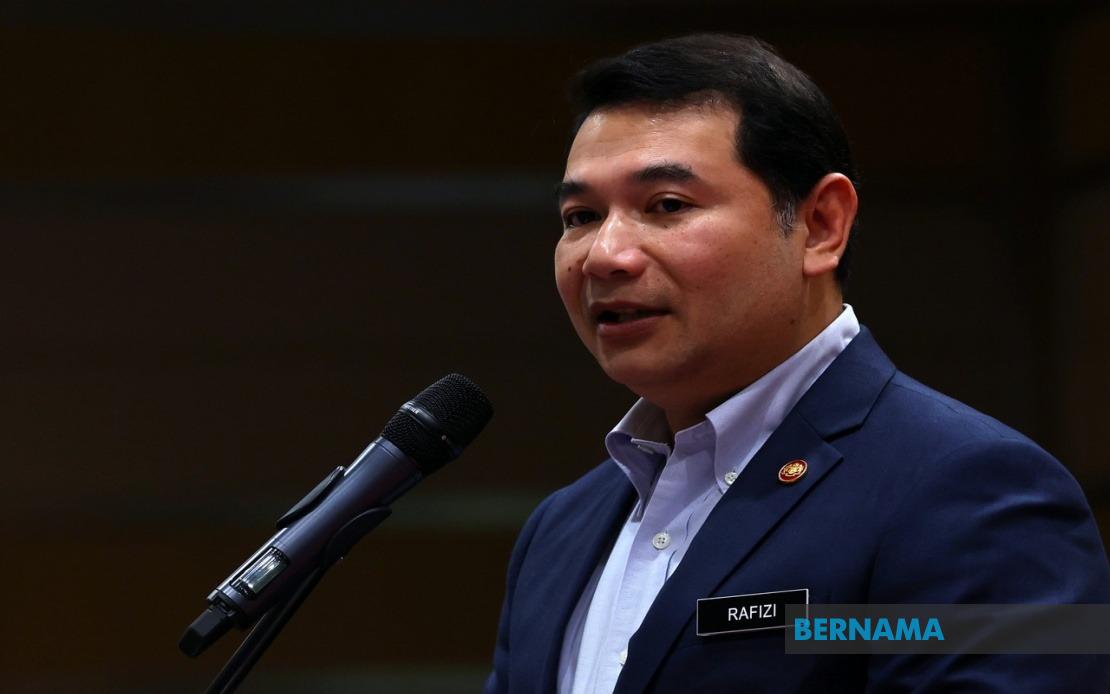News
Malaysia Faces Higher Gas Imports If It Doesn't Quickly Switch To Sustainable Energy - Rafizi

KUALA LUMPUR, May 3 (Bernama) -- The country faces higher imports of gas energy for electricity use in the coming years if it continues to depend on the commodity without efforts to accelerate the transition to more sustainable energy.
Economy Minister Rafizi Ramli said Malaysia imported about 25 per cent of gas last year to meet the country's needs due to the lack of production of natural resources such as oil and gas.
“I think not many people know that we (Malaysia) have started importing gas. This year it is expected that we will import about 30 per cent of our gas and this situation will continue.
“So, we have to tell the truth to the people, and the truth is painful,” said Rafizi when speaking as a panelist in the National Institute of Public Administration (INTAN) Minister’s Conversation (IMC) 2024 programme here today.
He explained that the current production of crude oil is low, which is around 400,000 barrels per day compared to 700,000 barrels per day over the last 20 years.
If no action is taken by 2050, Rafizi said Malaysia will be completely dependent on imported gas energy, which will increase the cost of living.
Rafizi explained that taking every RM1 dividend from Petronas also affects the company, where it reduces the financial ability of Petronas to go out of the country to develop new oil wells.
In the meantime, he said the challenge to restructure the country's economy will not happen just by creating an economic framework.
“On the other hand, something has to give way… there will not be a business as usual. Decisions have to be made to make sure the situation does not worsen (such as disparity etc).
“Secondly, any change from status quo… from point A to point B requires mindset and cultural change, and it is not easy for a country that has set its views and practices for decades, and this I think no economist can factor in,” said the minister.
Thirdly, he said the 'programme design' in a policy that is enacted also needs to be made by taking a comprehensive approach, because it will witness various challenges including issues of financial ability and feasibility, especially 'scaling up'.
"And the fourth thing that is a big challenge is to coordinate and make sure that the pace of change is the same everywhere, in every level (of execution) to each stakeholder.
“The important thing is that civil servants are aware that we need to emphasise on developing economic programmes that are suitable for acceptance and target groups.
“And the money that the government invests will have an impact and yield results, not only providing allocations to be distributed, but ultimately succeeding as planned," he added.
-- BERNAMA
Other News
Sarawak Lepasi Sasaran Kapasiti Gabungan Tenaga Boleh Baharu Tahun Ini - Abang Johari

Oleh Nur Ashikin Abdul Aziz
SINGAPURA, 21 Okt (Bernama) -- Sarawak mencapai 62 peratus sasaran campuran kapasiti tenaga boleh baharu (TBB) tahun ini, melepasi sasaran 60 peratus yang digariskan dalam Strategi Pembangunan Pasca COVID-19 (PCDS) 2030.
Sarawak Pacu Pertumbuhan Tenaga Boleh Diperbaharui Untuk Manfaat ASEAN - Premier

SINGAPURA, 21 Okt (Bernama) -- Sarawak komited menyokong peralihan tenaga boleh diperbaharui di Asia Tenggara dengan memanfaatkan potensinya sebagai "Bateri ASEAN," yang akan membekalkan tenaga bersih menerusi sambungan Grid Kuasa Borneo dan ASEAN.
Belanjawan 2025 Percepat Peralihan Kepada Tenaga Bersih - Solarvest

KUALA LUMPUR, 19 Okt (Bernama) -- Belanjawan 2025 merupakan satu langkah ke arah mempercepat peralihan kepada tenaga bersih di Malaysia, kata Solarvest Holdings Bhd.
© 2025 BERNAMA. All Rights Reserved.
Disclaimer | Privacy Policy | Security Policy This material may not be published, broadcast,
rewritten or redistributed in any form except with the prior written permission of BERNAMA.
Contact us :
General [ +603-2693 9933, helpdesk@bernama.com ]
Product/Service Enquiries [ +603-2050 4466, digitalsales@bernama.com ]